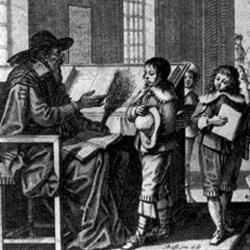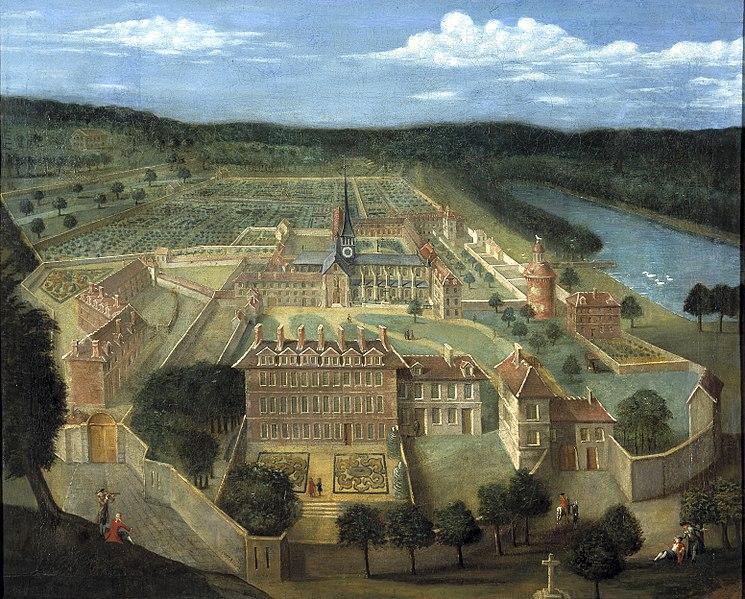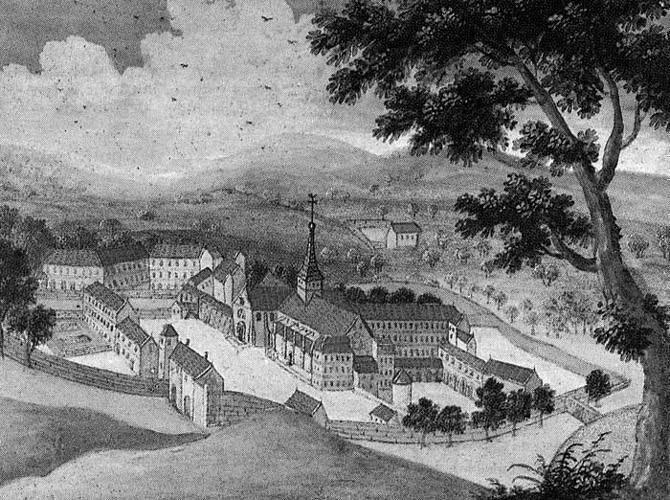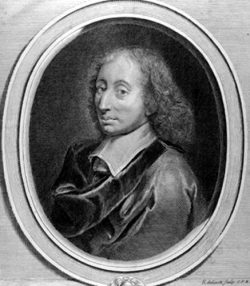Blaise Pascal (1623-1662)
The great mathematician and philosopher Blaise Pascal was quite closely associated with Jansenism. His younger sister, Jacqueline, who he was very fond of, entered the Abbey of Port-Royal des Champs. He himself was a member of the Abbey and lived not far away, he also adopted an ascetic life-style.
Blaise Pascal is of particular interest to Protestants
Blaise Pascal was born in Clemont-Ferrand in 1632 – his mother died a year after the birth of his sister Jacqueline and it was his father, a jurist who was also well versed in Latin and science, who instructed him mainly in his youth.
Some time after the death of his wife, he came to live in Paris then in Rouen, which had a circle of brilliant intellectuals at that time. Among the most interesting people there were Pierre Corneille (1606-1684) and Jean du Vergier de Hauranne, abbé de Saint-Cyran (1581-1643). Although Corneille was not a Jansenist he enjoyed debating with de Hauranne when they had conversations together about religious matters.
Due to his father, Pascal was soon immersed in the Jansenist sphere of influence, receiving an excellent education from them which helped him to develop into a particularly talented young man. From an early age, he became very interested in the ideas which were discussed amongst the Jansenists.
For Blaise Pascal, life was to be lived to the full, whether it was to brilliantly explore new areas of knowledge or to be forced to submit to physical pain (he especially suffered from headaches). Due to his Jansenist education, he was profoundly aware of the changing world around him, with all its inherent difficulties. He placed great value on friendship.
He fought against the excesses of deductive reasoning in all fields of thought, whether it was in mathematics, geometry, theology, philosophy or political thought. He noticed that a great many different solutions were available to solve practical difficulties and began to explore the realm of calculating probability ; this involved a series of complex mathematical calculations that could help to solve the problems of risk and uncertainty. This brought him into direct opposition with the probability theory upheld by reason. This theory implied that a particular solution to a problem, which, when it was demonstrated, might appear improbable, could nonetheless be accepted as viable if it satisfied a large number of people and especially those in a position of power. In his Provinciales, Pascaldenounced the way in which the Jesuit royal councillors misused the theory of probability.
Blaise Pascal was concerned by two particular issues : the difficulty of understanding the way the world worked and the necessity of relieving human suffering. He expressed these ideas many times and with great force in Pensées, a collection of notes and jottings, and especially in the text he wrote in which he wagered on the existence of God.
Fragment n° 105 of the Brunschwig edition (which is in n° 397 of the Le Guern edition. La Pléiade Editions, Paris 1999). The Wager argument :
Infinite nothing
We know the existence and the nature of the finite because we also are finite and have extension.
We know the existence of the infinite and are ignorant of its nature, because it has extension like us, but not limits like us. But we know neither the existence nor the nature of God, because he has neither extension nor limits. So we are incapable of knowing either what He is or if He is. However one thing is certain, either God is, or He is not – there is no middle way. Wager, then, without hesitation, that He is. If you gain, you gain all, if you lose, you lose nothing. So believe in Him, if you can.
Progress in the tour
Bibliography
- Books
- DELFORGE Francis, Jacqueline Pascal (1625-1661), Nolin, 2002
- MAURY Pierre, Saint Augustin, Luther, Pascal, Cahiers de Foi et Vie, Labor et Fides, Paris, 1930
Associated tours
-

Protestant education from the Reform to the Revolution
From the start of the Reform, great importance was assigned to reading and writing, tools necessary to religious instruction based on reading the Bible.
Associated notes
-
The Catholic reforming movements in 17th century France
The 17th century saw the rise of various movements attempting to reform the Catholic Church from within while avoiding any break-away. Such movements aimed partly at countering the influence in... -

Jansenism and Protestantism
By endorsing the teachings of Saint Augustine on grace and predestination – both of which were central themes of the Protestant Reformation – Jansenism sought to reform the Catholic Church... -

Jansenism : a movement of great influence
Jansenism was a very influential movement in France. This was partly due to its closeness to the Protestant Reformation.

